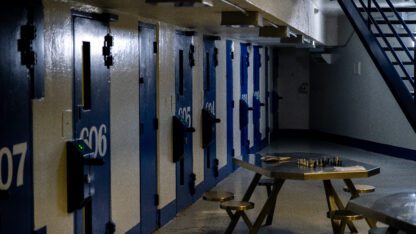The U.S. Supreme Court has been clear: In decisions, the justices said the harshest punishments levied against adult criminal offenders are unconstitutionally cruel and unusual when imposed on juveniles.
Like us on Facebook
After banning mandatory life without parole for juveniles 17 and younger convicted of homicide, the high court last year said the ruling applied retroactively to the more than 2,000 inmates already serving such sentences nationwide, and that all but the rare irredeemable juvenile offender should have a chance at parole.
Yet for many serving these terms, the ruling’s promise of resentencing and a chance at eventual release has so far been halting, inconsistent and sometimes elusive, a 50-state examination by The Associated Press found.
Here is a look at how Georgia is handling so-called juvenile lifers’ cases.
How Many Inmates Are Serving These Sentences?
The Georgia Department of Corrections provided a list of 25 inmates who received life without parole for crimes committed as juveniles. The Sentencing Project puts the total at 23.
Twenty-three were convicted on murder charges, one of armed robbery and one of kidnapping. The racial breakdown is: 21 black, two white, one Hispanic, one Asian.
Lacy Aaron Schmidt was the youngest at the time of his offense. Schmidt, now 20, was 14 when he shot his neighbor and one-time girlfriend, 14-year-old Alana Calahan, in Harlem, Georgia.
Has Anyone Been Resentenced?
Experts are aware of only one resentencing case in Georgia based on the U.S. Supreme Court’s decisions.
Robert Veal, now 23, was 17 and a member of a street gang known as the “Jack Boys” when he was convicted for murder, rape, armed robbery and other charges in October 2012, and sentenced to serve life in prison without parole.
The Georgia Supreme Court vacated the sentence last year and sent the case back to Fulton County court.
In the opinion, Justice David Nahmias cited a portion of the most recent U.S. Supreme Court ruling on juvenile lifers, emphasizing that such sentences should be permitted for only the “rarest of juvenile offenders … whose crimes reflect permanent incorrigibility” or “irreparable corruption.”
Steve Reba, an attorney who directs the Appeal for Youth Clinic at Emory Law School’s Barton Child Law and Policy Center, represents Veal.
Reba said the decision could potentially open the door for more appeals from juvenile lifers but that he knew of no other such challenges. Defense attorneys handling new juvenile cases could also leverage the decision at sentencing to argue against life without parole.
In January, Veal was resentenced to two consecutive life terms but could be eligible for parole at age 77, according to attorneys.
They argued that could still run afoul of the U.S. Supreme Court’s approach to lengthy sentences for juveniles, but prosecutors said justices only required some opportunity for parole, without a time frame.
Veal has asked the Georgia Supreme Court to review the new sentence.
What Is Georgia Doing?
Georgia hasn’t changed its law regarding juvenile sentencing after the rulings. But Veal’s challenge resulted in the state Supreme Court’s finding that a juvenile must be determined “irreparably corrupt or permanently incorrigible” to issue any sentence of life without parole.
Attorneys and other legal experts in Georgia said there’s no independent trigger for resentencing proceedings for those previously sentenced as juveniles to no-parole sentences. Individual inmates have to seek a review by a judge and typically need to find an attorney on their own for post-conviction work.
Why Is That An Issue?
In its rulings, the U.S. Supreme Court cites research showing that the brains of adolescents are still developing, making them susceptible to peer pressure and likelier to commit reckless acts without considering the long-term impact.
To punish youths with the same severity as adults and to then make those sentences mandatory — taking away any discretion to weigh each offender individually — fails to consider that difference or the potential for rehabilitation, the court said in determining that life without parole is unconstitutional for all but the rare juvenile whose crime reflects “permanent incorrigibility.”

9(MDAxODM0MDY4MDEyMTY4NDA3MzI3YjkzMw004))








